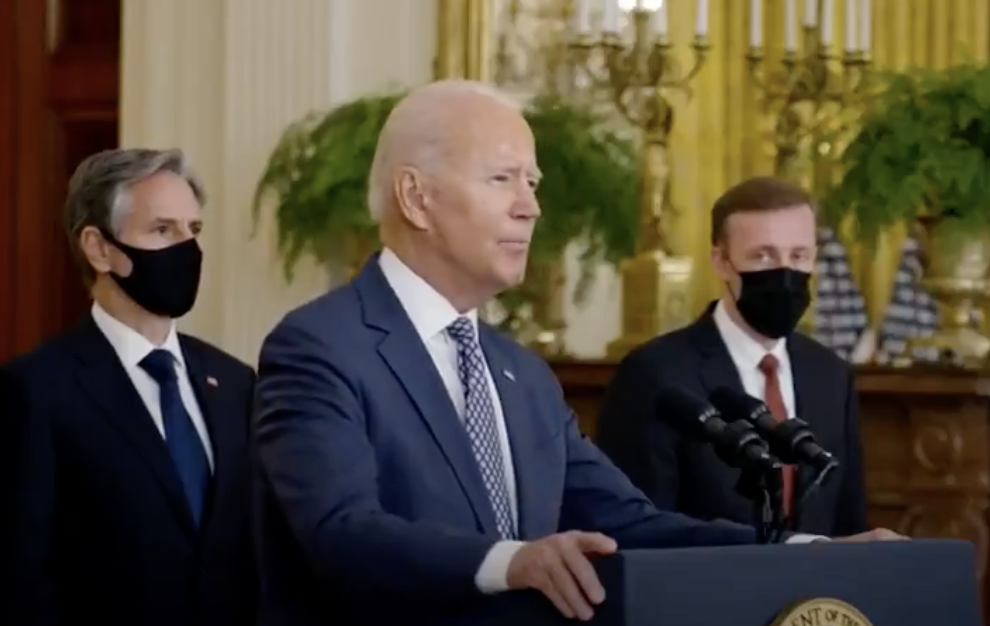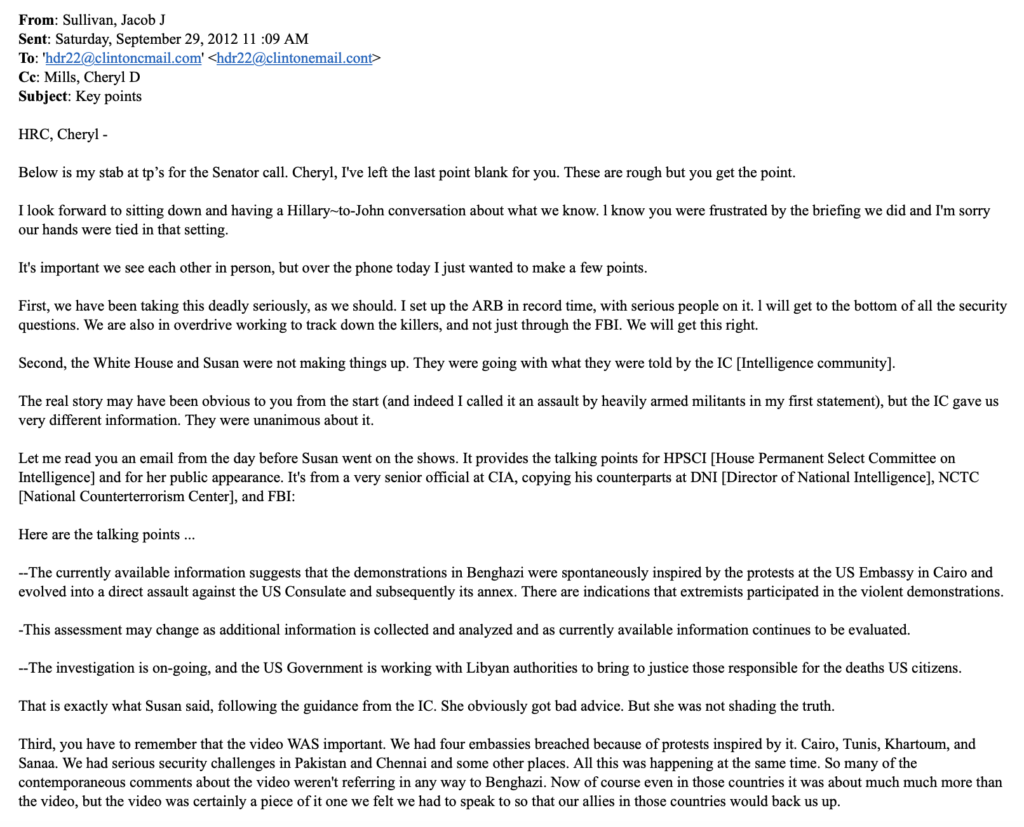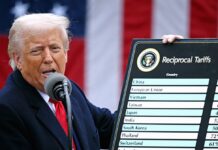
In defending the botched U.S. withdrawal from Afghanistan, Biden officials are saying they got bad advice, and that the Intelligence Community’s (IC) threat assessments as to how quick collapse could come turned out to be wrong. Advance warnings from diplomats on the ground in Kabul and others were reportedly brushed aside.
President Biden’s National Security Adviser Jake Sullivan is one of the key officials fending off criticism. He was doing much the same after another bungled government action in a different Islamic country nearly nine years ago: Libya.
On Sept. 11, 2012, Islamic extremist terrorists had attacked U.S. compounds in Benghazi, Libya, murdering U.S. Ambassador Christopher Stevens and three other Americans. Numerous Obama administration insiders later said a decision had been made high-up not to send the U.S. military to try to rescue the trapped Americans during the many hours of the attacks, despite troops who said they were ready and poised to help.
Defending Benghazi Missteps
The Obama administration, including Sullivan, who was then Deputy Chief of Staff to Secretary of State Hillary Clinton, heaped public blame for the attacks upon a “spontaneous mob inspired by an anti-Muslim video.” However, emails showed all U.S. officials knew from the earliest moments that the attacks were planned and executed by an Islamic terrorist group.
Back then, many observers were aghast that Obama officials hadn’t heeded specific terrorist threats nearing the anniversary of the 9/11 terrorist attacks, and didn’t put U.S. forces in place in case there was an emergency.
Likewise, many are confounded by the lack of foresight by Biden officials in Afghanistan.
With Libya, as with Afghanistan, administration officials argued that their assessment, that there was no immediate threat, was correct the moment it was uttered, but that ‘the situation changed.’ Critics say these officials’ unwillingness to acknowledge they misjudged, or simply were wrong, impedes the opportunity to learn lessons and avoid a repeat of the same mistakes.
Regarding Libya, Obama administration insiders and emails revealed an extensive and well-documented series of specific advance warnings over a period of months, as well as pleas from Ambassador Stevens and other U.S. State Dept. and military personnel on the ground, for added security.
The requests were denied in Washington D.C. and security in Libya was drastically drawn down.
In the Afghan debacle, fault is being placed, in part, on flawed Intelligence Community (IC) assessments regarding how soon the country could fall. The same was true with the Libyan tragedy.
In a 2012 email that was kept secret for years, Sullivan told Hillary Clinton that the Intelligence Community (IC) was at fault for providing the incorrect information that blamed a video for inspiring the Benghazi attacks, and he says the IC was “unanimous” about it.
The real story may have been obvious to you from the start (and indeed I called it an assault by heavily armed militants in my first statement), but the IC gave us very different information. They were unanimous about it.
Jake Sullivan to Hillary Clinton and Cheryl Mills in September 2012 email
Below, you can read the email Jake Sullivan wrote to his boss, Hillary Clinton, and her confidant Cheryl Mills.
Sullivan, Burns, Blinken, Psaki
Sullivan was a key participant in email chains involving controversial edits to the Benghazi talking points. Among other changes, the edits removed mentions of the attackers’ “ties to al Qa’ida” and changed the word “attacks” to “violent demonstrations.”
Another familiar face from Benghazi is Jen Psaki, now White House spokesman. Psaki was the State Department spokesman during Benghazi and defended the edits to the talking point.
When asked why a top State Department official told other officials to delete mention of terrorism in discussing the Benghazi attacks with Congress, Psaki said “there was concern about preserving the integrity of the investigation” and they didn’t want “members of Congress [to provide] more guidance to the public than the Administration.”
When Hillary Clinton resigned as Secretary of State, Sullivan went on to become the Deputy Assistant and National Security Adviser to then-Vice President Biden. He is said to have helped shape U.S. foreign policy toward Libya and Syria.
Watch Sullivan’s Aug. 17, 2021 Afghan briefing
The current Secretary of State, Anthony Blinken, was serving as then-Vice President Biden’s National Security Adviser during the Benghazi attacks, and was promoted to the spot as Obama’s Deputy National Security Adviser, and then to Deputy Secretary of State under John Kerry.
The current CIA Director, William Burns, also had a presence and a role during the Benghazi attacks. As Deputy Secretary of State under Hillary Clinton, Burns told Congress, “We’ve learned some very hard, and painful lessons in Benghazi, and are acting on them.”
Dealing with Terrorists
Last week, Sullivan assured the public that the Taliban has committed to the safe exit of Americans in Afghanistan. He has some experience dealing with Islamic terrorists. Under the Obama administration, he was credited– or blamed, depending on one’s view– with holding numerous secret meetings with the Iranian regime.
The meetings resulted in the controversial payment of $1.7 billion to Iran, the world’s largest state sponsor of terrorism, to secure a promise that Iran would limit its development of nuclear weapons and release four American prisoners.
Joining Sullivan in negotiating the Iran deal was Burns.
Today, many analysts blame U.S. missteps in Libya for allowing the country to disintegrate. It became a breeding ground and pass-through for radical Muslims who ended up fighting in Syria and becoming part of the rise of the murderous ISIS movement.
Read my Benghazi investigative reports, which were recognized with an Emmy nomination, by clicking here.
Read the 2012 Sullivan email to Clinton.
The email from Sullivan to Clinton is dated September 29, 2012, eighteen days after the attacks. It refers to the controversy over Obama official Susan Rice, who had appeared on TV network Sunday talk shows presenting the incorrect talking points that blamed a “spontaneous” mob.
Based on the email, it appears as though someone had asked, on Clinton’s behalf, to answer the accusation that “Susan” had “made things up.” It also seems to imply that Clinton knew “the real story” (the terrorist nature of the attacks) from the start– although she immediately blamed the anti-Muslim video in a meeting with victims’ family members.

From: Sullivan, Jacob J
Sent: Saturday, September 29, 2012 11 :09 AM
To: ‘hdr22@clintoncmail.com‘ <hdr22@clintonemail.cont>
Cc: Mills, Cheryl D
Subject: Key points
HRC, Cheryl –
Below is my stab at tp’s for the Senator call. Cheryl, I’ve left the last point blank for you. These are rough but you get the point.
I look forward to sitting down and having a Hillary~to-John conversation about what we know. l know you were frustrated by the briefing we did and I’m sorry our hands were tied in that setting.
It’s important we see each other in person, but over the phone today I just wanted to make a few points.
First, we have been taking this deadly seriously, as we should. I set up the ARB in record time, with serious people on it. l will get to the bottom of all the security questions. We are also in overdrive working to track down the killers, and not just through the FBI. We will get this right.
Second, the White House and Susan were not making things up. They were going with what they were told by the IC [Intelligence community].
The real story may have been obvious to you from the start (and indeed I called it an assault by heavily armed militants in my first statement), but the IC gave us very different information. They were unanimous about it.
Let me read you an email from the day before Susan went on the shows. It provides the talking points for HPSCI [House Permanent Select Committee on Intelligence] and for her public appearance. It’s from a very senior official at CIA, copying his counterparts at DNI [Director of National Intelligence], NCTC [National Counterterrorism Center], and FBI:
Here are the talking points …
–The currently available information suggests that the demonstrations in Benghazi were spontaneously inspired by the protests at the US Embassy in Cairo and evolved into a direct assault against the US Consulate and subsequently its annex. There are indications that extremists participated in the violent demonstrations.
-This assessment may change as additional information is collected and analyzed and as currently available information continues to be evaluated.
–The investigation is on-going, and the US Government is working with Libyan authorities to bring to justice those responsible for the deaths US citizens.
That is exactly what Susan said, following the guidance from the IC. She obviously got bad advice. But she was not shading the truth.
Third, you have to remember that the video WAS important. We had four embassies breached because of protests inspired by it. Cairo, Tunis, Khartoum, and Sanaa. We had serious security challenges in Pakistan and Chennai and some other places. All this was happening at the same time. So many of the contemporaneous comments about the video weren’t referring in any way to Benghazi. Now of course even in those countries it was about much much more than the video, but the video was certainly a piece of it one we felt we had to speak to so that our allies in those countries would back us up.








